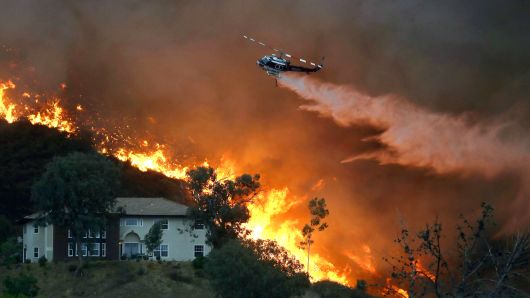
To be rational is to know that weather events cannot be causally related to climate change, although exacerbation is another issue. Yet when the news is full of record setting fires in California and Greece and Australia, temperature records tumbling, and typhoons and hurricanes relentless in their intensity, one might be forgiven for wondering.
Those who are not climate scientists can only interpret research done by others for the general public and form opinions colored by their work. That sum of work as it develops becomes more frightening by the day, with a strong fear the predictions will come true earlier than anticipated.
Now there is new climate research on the troposphere, a region extending from the surface of the earth to 16 km (10 miles) at the tropics and 13 km at the poles. Researchers have studied the amplitudes of the annual cycle of tropospheric temperatures, the highs and the lows, and how these have changed over time. Above all, they have examined human agency.
The news, as they say, is not good. Their results the authors state, “provide powerful and novel evidence for a statistically significant human effect on earth’s climate.” They call it ‘anthropogenic forcing’.
As a consequence we have “pronounced midlatitude increases in annual cycle amplitudes in both hemispheres.” These are repeated in satellite data. It means higher tropospheric temperatures in summer and lower in winter.
Not only is there “seasonality in some of the climate feedbacks triggered by external forcings” (read human fingerprint), say the authors, but worse “there are widespread signals of seasonal changes in the distribution and abundance of plant and animal species.” In other words, we are screwing up wildlife, both plant and animal.
It is as if the air in the earth’s attic is warmer in summer and colder in winter. And its air conditioner, the tropical rainforest is on the blink. Greed for hardwoods and farmland has resulted in serious depletion.
Meanwhile, carbon dioxide levels continue to soar, exceeding 412 ppm on May 14, 2018. The last time the earth reached a 400 ppm threshold was several million years ago. The human footprint here is proven through the negative delta13C levels caused by fossil fuel use because plants are lacking in the 13C isotope of carbon. Combining the CO2 rise with increasing tropospheric temperature cycle amplitudes can only magnify the problem. A new report in the Proceedings of the U.S. National Academy of Sciences lays out a scenario for a self-reinforcing feedback loop, a ‘hothouse earth’ at which point no human action could prevent catastrophe.
A quick glance at recent weather disaster reports, several within a week, should satisfy skeptics of the exacerbation of extreme events:
The Mendocino Complex fire in California is the largest in the state’s history. It is uncontrollable and expected to burn through August.
Record breaking rains in Western Japan have resulted in floods causing over 150 fatalities and mudslides knocking over and destroying homes. “We’ve never experienced this kind of rain before,” said a weather official.
Floods in France have led to the evacuation of 1600 people. The flooding comes after the area and much of Europe suffered extremely hot weather. Thus in July, devastating wildfires in Greece killed 92 people. And as warning in Southeastern Australia, the bushfire season has been brought forward two months from October due to excessively dry hot weather.
Extremely heavy rains in Toronto have flooded the city. Two men trapped in a basement elevator were rescued through the heroic efforts of first responders, who swam to the elevator and used a crowbar to open the doors. There was just a foot of breathable air when the men swam out.
The climate story is not new; from Svante Arrhenius, the Swedish scientist who foresaw global warming from the use of fossil fuel (and thought it to be fortunate for Northern Europe) to James E. Hansen the climate scientist who, in historic Senate testimony on June 23, 1988, gave clear warning of the greenhouse effect that was changing the earth’s climate.
The Intergovernmental Panel on Climate Change was established later that year, although the Montreal Protocol a year earlier had set the stage. The Fifth IPCC Assessment was published in 2014 and the next one is due in 2022. Yet, what have we learned?
On July 19, 2018, the House of Representatives passed a non-binding resolution, H.Con.Res.119, denouncing a carbon tax as detrimental to the U.S. economy. As we march to climate self-destruction, the president wants to increase the use of coal and has withdrawn from the Paris Agreement.
So there we are … the ostrich syndrome in full effect.
Dr Arshad M Khan (http://ofthisandthat.org/index.html) is a former Professor based in the U.S. whose comments over several decades have appeared in a wide-ranging array of print and internet media. His work has been quoted in the U.S. Congress and published in the Congressional Record.
Courtesy: https://countercurrents.org